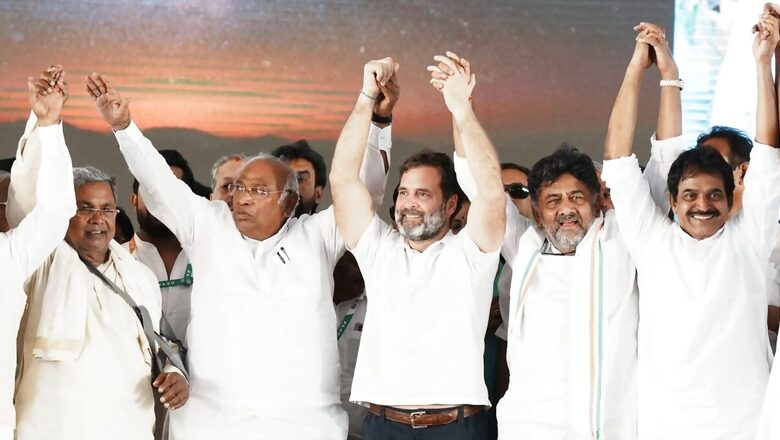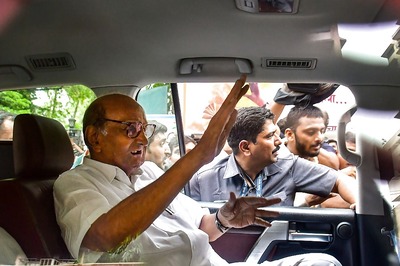
views
The Karnataka lection results indicate that the Congress party is all set to form the government in the state. This kind of vigour and desire to win an election is unquestionably a positive omen for the party. After a long time, Congress showed such enthusiasm to campaign in an election. There is no doubt that this victory will give Congress an edge in national politics. In this election, after a long time, starting from the state leadership to Congress President Mallikarjun Kharge and the Gandhi family campaigned together. There are several reasons, such as the wrong decision of the Bharatiya Janata Party (BJP) in terms of ticket distribution, management of leadership and infighting, which caused this result.
However, certain fault lines have emerged as a result of the election, and they speak volumes about the future direction of Congress. The Karnataka election campaign of the Congress revealed that the party has little to offer in terms of a vision centred on development. The manifesto of the Congress makes it obvious that the party is losing its originality and focusing on either appeasement-centred issues or populist measures. This is a crucial juncture for Congress to realise that this victory should not be treated as a stamp of approval for these fault lines. While appeasement of any community must be avoided in India’s current political context, there is no justification for engaging in populist politics without considering the ground realities of the state.
Focus on local issues
Despite attempts from the Gandhi family to focus on issues that are not related to Karnataka, the local leaders of the party have successfully kept the election grounded. The local organisation of the party attempted to keep the campaign focused on local issues such as corruption, unemployment, the advancement of women, and other issues, despite a number of internal disputes. Some of the initiatives, such as financial assistance for women and unemployed youth in the state, were also included in the congress. Although populist in nature, these decisions have ties to grassroots demands.
With the participation of the Gandhi family and national leaders, however, the entire narrative shifted. From Congress President Mallikarjun Kharge to Rahul, Priyanka, and Sonia Gandhi, the majority of their statements have been directed at the BJP. In a number of other states, including Gujarat, the party has attempted to pursue the same course by ignoring local concerns. It is not an effective strategy. Congress can only grow by remaining local and avoiding having all of Indian politics appear to be RSS vs. Congress or PM Modi vs. Congress. The party must realise that in the future, it will also need to keep its focus on the issues in the state elections. The clear winner here is the state leadership of the Karnataka Congress.
Avoid personal attacks on PM Modi
It was not at all remarkable that the Congress would ultimately resort to personal attacks against Prime Minister Narendra Modi. It has become the norm in Congress to use the harshest language when criticising the Prime Minister. And the election in Karnataka is not the first. In national politics, during Parliament sessions, and at every political rally, the Gandhi family and Congress leadership repeatedly emphasise the same message. During the Karnataka election campaign, Congress president Mallikarjun Kharge attacked the Prime Minister by comparing him to a poisonous snake (he subsequently clarified, but the damage was done), Priyanka’s “Cry PM” remark, etc.
From the Chowkidar Chor Hai campaign during the 2019 Lok Sabha elections to chants of “Modi-Adani Bhai Bhai” inside Parliament. It is essential for the Congress to recognise that these types of personal assaults against Prime Minister Modi have never benefited the party electorally. This is why this victory in Karnataka should not be seen as a success for such condemnable personal attacks. At the end of the elections, focus should be on local issues, and if the Congress believes that these mindless attacks against the PM are the reason behind its victory, then they are wrong. It is a good opportunity to realise that the Congress will need strong local leaders, narratives, and discourse to win elections.
Politics based on appeasement
The banning of any political or social organisation that engages in extremist activities is an essential measure, and every government, regardless of political ideology, should take the same action. If the Congress had not mentioned Bajrang Dal alongside the Popular Front of India, the political interpretation of the situation may have been different. The placement of PFI and Bajrang Dal on the same line is indicative of appeasement politics. Through this, the Congress hopes to appease Muslims, who may suffer from the PFI’s ban and be delighted to see the name Bajrang Dal. If this is the future of political discourse in Congress, nothing could be more tragic.
It would be dangerous if the Congress believed that such attempts at appeasement had worked positively for the party and would continue to work, but it would only weaken the party further. Appeasement can bring some quick success, but it is a shambolic way of doing politics. Playing with the sentiments of the communities cannot be an acceptable way of playing politics, irrespective of the positive outcome. A great example of such politics and its effect is West Bengal under the leadership of CM Mamata Banerjee. The ruling Trinamool Congress has been winning elections after elections depending on their appeasement-centric politics, but today the state is suffering from massive law and order issues and communal conflict.
Way ahead
The Congress should also look into its position to be closer to the left-liberal ecosystem. The pertinent question should be whether the victory in Karnataka has anything to do with all these or is a state-centric phenomenon. Regardless of the victory in the Karnataka elections, Congress must recognise that these fault lines will ultimately destroy the party. The Congress is losing its originality as liberal ideology gains ground. Inviting liberals as visitors on the Bharat Jodo Yatra was another attempt by Rahul Gandhi to demonstrate his proximity to them. If Congress attempts to close its eyes and ignore the fact that India’s politics are changing and development is becoming the top priority, there is no room for appeasement in contemporary Indian politics.
The victory in Karnataka is commendable for Congress, but the future of the party will be dependent on whether it acknowledges these faultlines and tries to change its politics or not. This victory is a good start for Congress to work on state leadership and a state-centric political narrative. But if the party believes that this victory is nothing but acceptance by the people of these faultlines, like appeasement, then the future of the party will remain at stake.
The author is a columnist and Doctoral Research Scholar In Media & Politics. He tweets @sayantan_gh. The views expressed in this article are those of the author and do not represent the stand of this publication.




















Comments
0 comment